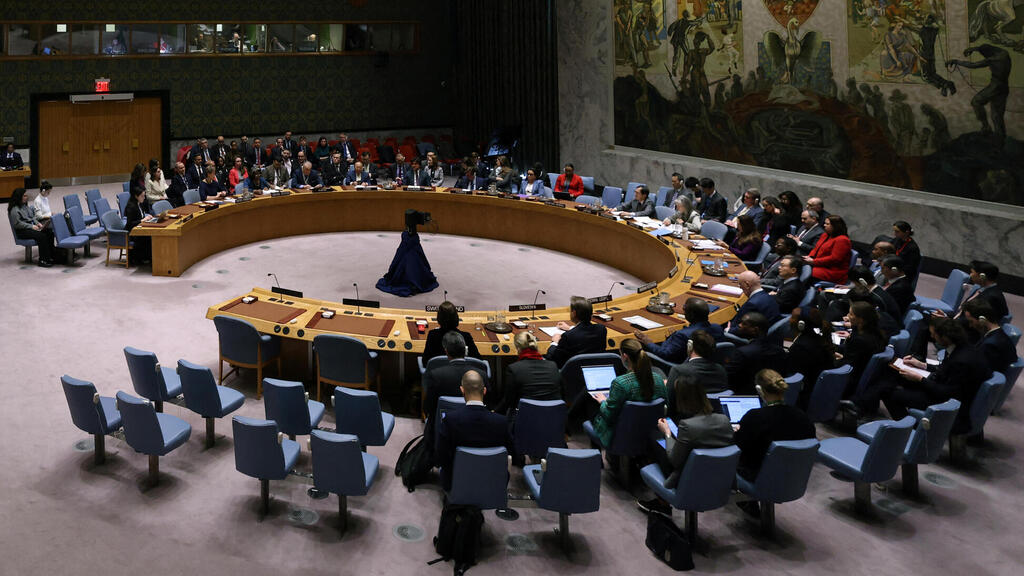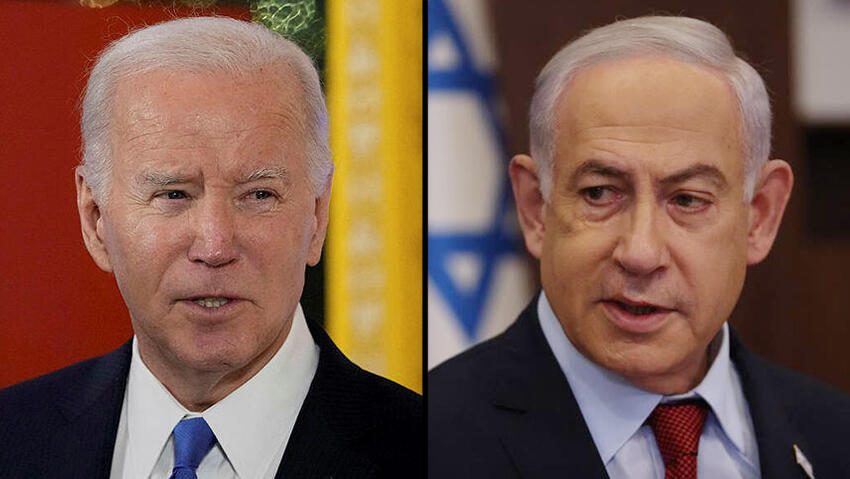Getting your Trinity Audio player ready...
The "demand" for an immediate cease-fire passed Monday by the United Nations Security Council is not binding and has no immediate meaning; however, it may have worrisome consequences for Israel. The decision was passed by 14 of the UNSC's 15 member countries to the applause of the council members, who even claimed that it was a "historic decision," because for the first time the Security Council called for an immediate cease-fire in Gaza and the United States did not veto it.
2 View gallery


UN Security Council meets to vote on Gaza cease-fire resolution
(Photo: REUTERS/Mike Segar)
Israel fears that the continuation of the fighting now will lead to a discussion in the international community about violating the Security Council's decision to demand a cease-fire with Hamas, while applying no pressure to the terrorist organization. And the fact that it is likely that Israel will not honor the decision strengthens the arguments against the Jewish state at the International Court of Justice in The Hague (ICJ) and the International Criminal Court (ICC) – which only makes the situation worse.
"This is a very complex and dangerous decision. We claimed that a cease-fire would come as a result of the release of hostages, and the resolution basically says that a cease-fire is a value in itself," a senior political official said.
The source referred to Prime Minister Benjamin Netanyahu's decision to stop the Israeli delegation from traveling to Washington in response to the U.S. decision to abstain from voting on the resolution and to not veto it. "His response exacerbates the problem. He puts us further into a corner by canceling the delegation to the United States," the source added.
"As soon as there are condemnations on the other side, then there is a veto by Russia and China. And now we don't have an American veto in our pocket. The decision is not good because the call for a cease-fire is disconnected from any action by the other side, the pressure is put on us, and only us," he said.
Another senior political figure said that "the Security Council's call for an immediate cease-fire is very problematic - because it does not impose anything on Hamas."
"They are actually calling for a cease-fire and the release of the hostages, and this means that they can put pressure on us for a cease-fire, which is exactly what the countries of the world want, and they will not put pressure on Hamas - because they have no way to put pressure on them," he said.
"This invites international pressure on Israel and not on the other side," according to one of the political sources.
Foreign Minister Israel Katz said after the vote that Israel "will destroy Hamas and continue to fight until the last of the hostages returns home."
The U.S.'s abstaining on the cease-fire resolution and the cancellation of travel of the Israeli delegation to Washington has deepened the crisis in relations between Israel and the U.S. The Prime Minister's Office said in a statement following the vote that "the United States has abandoned its policy in the UN today. Just a few days ago, it supported a Security Council resolution that linked a call for a cease-fire to the release of hostages."
2 View gallery


US President Joe Biden and Prime Minister Benjamin Netanyahu
(Photos: Jonathan Zindel/Flash90, Reuters)
"Today’s resolution gives Hamas hope that international pressure will force Israel to accept a cease-fire without the release of our hostages, thus harming both the war effort and the effort to release the hostages," the statement said.
However White House spokesman John Kirby, clarified: " "Our vote does not reflect a change in our policy. We are consistent in our support for a ceasefire and the release of hostages. The wording does not include condemnation of Hamas, so we did not support it, but the decision reflects our opinion that a ceasefire and the release of hostages are bound together, so we abstained."
Despite the announcement from Netanyahu's office about canceling the delegation, Kirby added: "The talks will continue regardless of the Israeli frustration with our vote today."
The crisis between Israel and the United States has many implications for the negotiations for a hostage deal, and it may lead to a hardening of positions on both sides. It also weakens the levers of U.S. pressure on Israel to be flexible in negotiations for a deal.
Read more:
The resolution passed by the Security Council affects the negotiations for a hostage deal and gives hope to Hamas that it will be able to get a cease-fire thanks to international pressure even without agreeing to a hostage deal. In addition, the decision sends a message to the international community that Israel is more isolated than ever, and it could later be an excuse for countries to take diplomatic measures against Israel or stop arms sales to Israel.
This is the first proposed resolution since the outbreak of the war that has been passed by the Security Council and calls for an immediate cease-fire. The resolution is non-binding, however. The Security Council has previously called for additional humanitarian aid to be brought into the Gaza Strip and the release of the hostages, but those proposed resolutions have not passed.
The proposal was promoted by the 10 non-permanent-member countries on the council, and it received the backing of both Russia and China - and the support of the 22 countries of the Arab bloc at the United Nations. In a statement published by the Arab bloc countries before the vote, they called on the 15 members of the Security Council to "act with unity and urgency" and approve the proposal, "in order to stop the bloodshed, preserve human life and prevent further destruction and human suffering."


